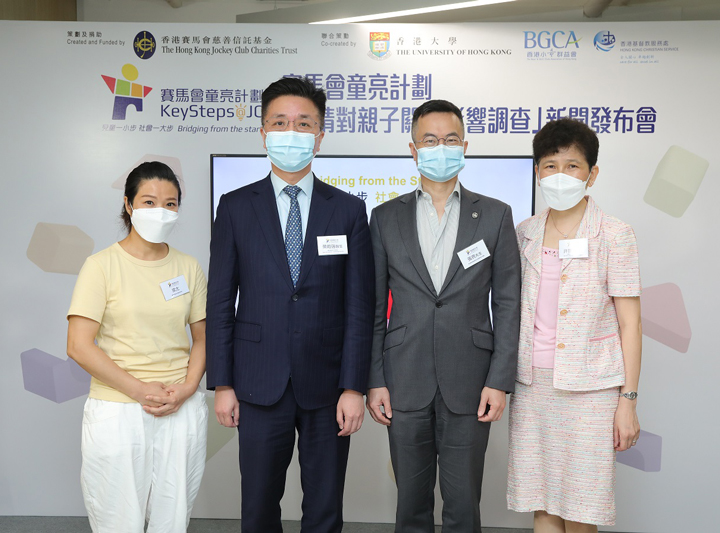

Charities & Community
Emergency and Poverty Relief
KeySteps@JC survey finds the pandemic has strained family relationships
17/06/2022
KeySteps@JC is created and funded by The Hong Kong Jockey Club Charities Trust, and co-created by the University of Hong Kong (HKU), the Boys' & Girls' Clubs Association of Hong Kong and the Hong Kong Christian Service. It conducted a survey in May to look into children development during the pandemic. In particular, it focused on children’s learning progress, parent-child activities, as well as physical and mental health. A press conference was held on 6 June to announce the findings.
The Club’s Executive Director of Charities and Community Leong Cheung; KeySteps@JC Project Director / HKU’s Department of Pediatrics & Adolescent Medicine Clinical Associate Professor Dr Patrick Ip; and Project Investigator / City University of Hong Kong’s Department of Social & Behavioural Sciences Associate Professor Dr Anna Hui took part in the press conference.
"A child is like a sapling that needs nurturing, care and a proper environment to grow in. Quality universal childcare and education are necessary to form a solid foundation for the physical and mental health of our future generations,” Mr Cheung said. “Therefore the Club initiated KeySteps@JC in 2017. We developed a child-focused support model to provide crucial support to underprivileged children at early stages, with the help of multidisciplinary professionals from the medical, education and welfare sectors.” Mr Cheung added that the Club has always been committed to building a better society through its unique integrated business model that contributes tax revenue and charitable donations.
In the first five years of KeySteps@JC, it has supported young children in terms of their education, family relationships as well as physical and mental health. Special attention went to children from underprivileged families to address their growth and development needs. In May of this year, the project team conducted an online survey among 700 parents. The summary of the findings is as follows:
• Over 80% of parents expressed concern about their children's growth and development, including their academic, social development and physical health.
• Among the 80% of worried parents, more than 40% believed that their relationships with their children had worsened in the previous two months; nearly 65% of them felt stressed when teaching their children to study and complete their homework, in addition to handling housework and working from home; more than 60% of parents opined that parent-child relationship has been affected as children were prone to emotional or behavioural problems when they feel bored at home; more than 40% of the parents quarrelled with children more frequently as they feel gloomy during lockdown.
• More than 75% of parents thought that support from schools was helpful or very helpful; while more than half of the parents thought that support from spouse/family members/relatives and friends was helpful or very helpful. Nearly 45% of the parents thought that support from the community or social organisations was helpful or very helpful in easing the burden of caring for children.
The project team explained that early support for underprivileged families to relieve parenting pressure can help improve parent-child relationships and the development of young children.
KeySteps@JC supports underprivileged young children in building stronger foundations in their early years for better life outcomes. Multidisciplinary collaboration, involving the education, medical and welfare sectors, help develop a holistic intervention model in schools, family and the community to help children and families. The project has been rolled out to 32 local kindergartens in two pilot districts (Tin Shui Wai and Sham Shui Po) and built the capacity of around 300 teachers in the pilot schools, covering around 6,000 children and their families.


